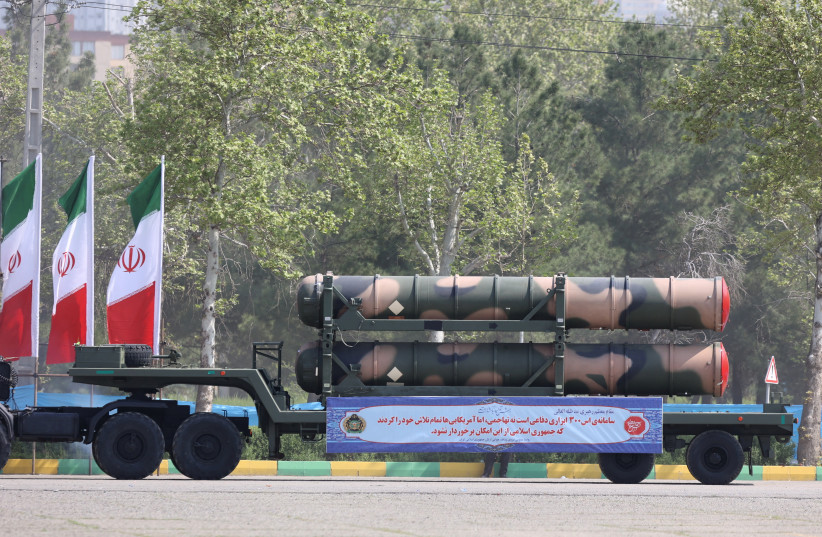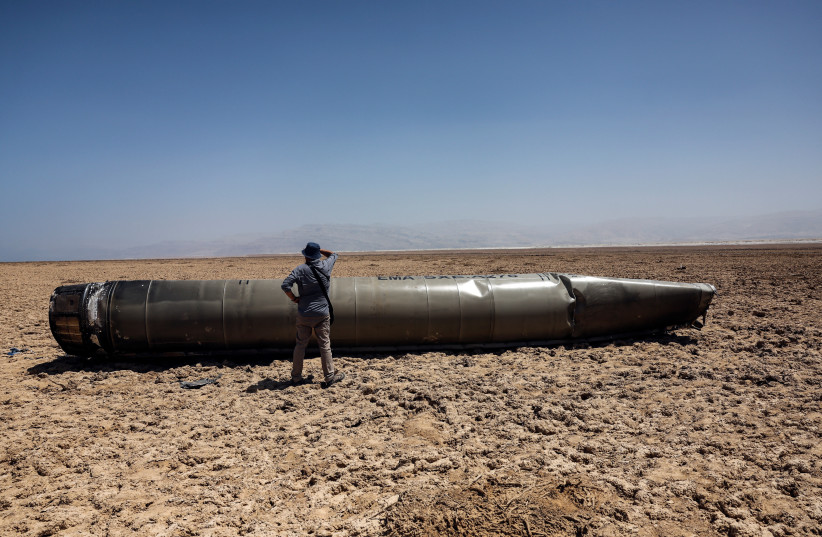In the world of policy, sometimes, very sophisticated people make arguments that rely on a foundation of blatantly circular logic.
The West’s criticism of Israel’s policy on Iran – a policy that will need to be fundamentally reevaluated after Tehran’s unprecedented missile and drone attack on April 14 – is one such example.
Many Westerners criticized Israel for assassinating the IRGC commander for Syria and Lebanon, Mohammed Reza Zahedi, on April 1. These same critics also urged Israel not to attack the Islamic Republic’s nuclear weapons program.
In the end, Israel somewhat heeded those critics, with Transportation Minister Miri Regev confirming an Israeli attack on Iran’s S-300 anti-aircraft missile system – as a warning to Iran of the damage Israel could have done, but no more than that.
It is far from clear that this move provided safety for Israel in any direct attacks from Iran in the future.

Those who slammed Jerusalem for killing Zahedi said he was too high ranking and the assassination destabilized the region. They add that Israel was surprised at the intensity of Tehran’s anger, and its first-ever direct attack on the Jewish state was proof that the strike was indeed very painful.
The critics then urged Israel not to attack Iran back to avoid a spiraling conflict. Most importantly, to avoid a regional war, they urged Israel not to target Iran’s nuclear weapons program.
Essentially, they are calling to sit back and wait for the ayatollahs and their proxies to do their worst against Jerusalem, always to be defensive.
Zahedi was not killed in a vacuum, however, which is the way most global media reported it – as if the conflict between Israel and Iran started with his “unprovoked assassination” on April 1.
But Zahedi was not an innocent man. He directed a relentless terror campaign against Israel for years from both Syria and Lebanon.
Hezbollah in Lebanon has fired on Israel thousands of times with rockets and anti-tank missiles since October 7, while militias in Syria likely fired hundreds of times.
But, for around a decade before October 7, the IRGC, led by Qasem Soleimani or Zahedi, or both, rallied Hezbollah and Syrian militias to attack Israel, developing a massive buildup of rockets and militias on Israel’s borders to prepare for an invasion or multi-front war – much like the current one.
Israel has been trying to hold Iran, its proxies, and Zahedi at bay with thousands of its own strikes on attempts by Tehran to smuggle more advanced weapons to the border with Israel, either through Lebanon or Syria.

Israel would have no beef with Iran if the ayatollahs were to leave the Jewish state alone. The two states are around 1,500 km. apart, and there are no land disputes between them. If Iran were to stop threatening Israel simply, Jerusalem would not order any strikes on Iran because there would be no cause to do so.
When Israel decided to target Zahedi, the goal was to send a message to Iran: that its years of pressing Hezbollah, Syria, and Hamas in Gaza to attack and wear down Israel would not go unanswered.
Hamas, of its own volition, chose October 7 as the date to invade, breaking an existing ceasefire. It should be remembered that none of this could have been done without Iranian funding, planning, weapons, and training.
Israel had justification to attack Zahedi
Israel had plenty of reasons to remove Zahedi, and killing him was far from unprovoked.
When Jerusalem decides in the future whether it is in its strategic interest to target Zahedi’s successor or another similar very high-ranking IRGC official, it will not need to weigh whether it is worth the risk—it will have all the information it needs. Such a strike would not be carried out in a vacuum.
Will Israel be more endangered by a future backlash by another aerial attack direct from Iran to avenge the death of one of its top IRGC officials, or will it be more endangered if it does nothing and allows the Islamic Republic to slowly attack it and surround it with more and more deadly weapons?
This is not a simple balancing act, and it is one that Israel will have to weigh carefully – as opposed to the simplistic formula of some Western critics, acting as if using restraint is a strategy that could keep Israel safe from Iran.
And for those advising Israel not to strike Iran’s nuclear program in response to the aerial attack – how do they think Jerusalem should have responded? What should have been an appropriate response?
The attack could have killed thousands of Israelis, making the October 7 massacre look like a warm-up. It could also have eliminated Israel’s F-35 squadrons, hampering Israeli national offensive and defensive power for the next decade.
These critics don’t want Israel to attack the nuclear program, nor Iranian officials in Lebanon and Syria who are planning terror campaigns against Jerusalem.
Do they think that the Islamic Republic won’t fire missiles, rockets, and drones at Israel again because the Jewish state showed it was magnanimous?
How far will a US guarantee to defend Israel from such a future attack deter Iran when the worst thing that could happen to Tehran is that its missiles will not get through, and its “best” case scenario is killing thousands of Israelis?
Israel may have missed a unique opportunity to set back Iran’s nuclear program, which would have been legitimized as “retaliation” for Tehran’s massive attack. But the US and the West pressed against it, so Jerusalem found a middle ground that did not draw blood, essentially letting Iran off the hook.
From the US’s perspective, in the short term, maybe it saved Israel from itself: from rushing into an unnecessary intensified regional war.
The difference is that Israel needs to live in this region long after the US may lose focus or interest and will eventually need to recalibrate how it can both prevent Iran’s proxies from raining down a “ring of fire” on it, as well as stop Tehran from breaking out to a nuclear weapon, which could endanger Israel on an existential level.
Balancing the risks of retaliating is vital, but continual restraint as a set strategy for dealing with a hardened adversary such as Iran will eventually be more dangerous than acting.
